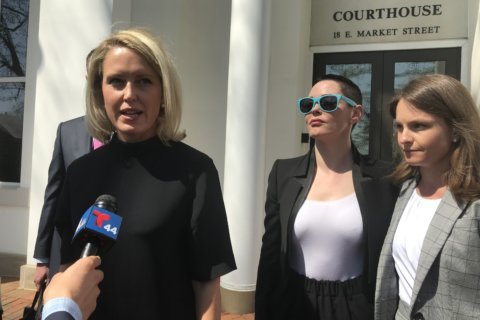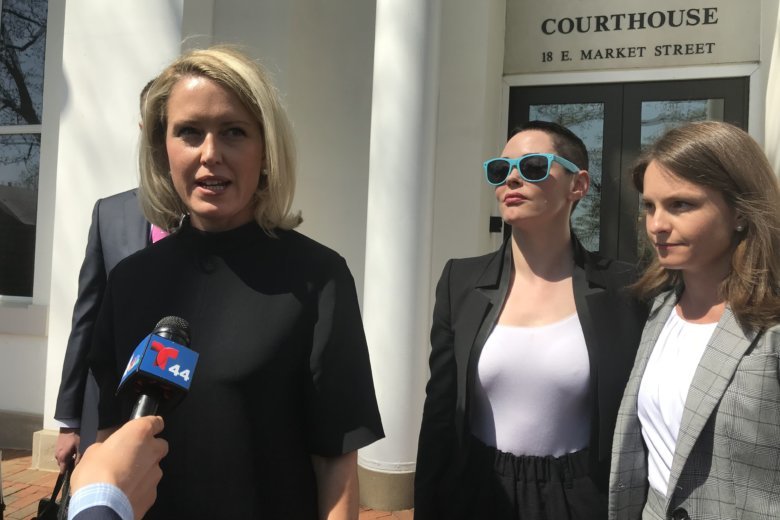
LEESBURG, Va. — Moments after lawyers for actress-activist Rose McGowan told a judge the prosecution’s felony drug possession case against her was “obviously flawed from its inception,” and “so weak” it would never have been brought if she weren’t a public figure, a Loudoun County District Court judge found probable cause, and ordered the case sent to a grand jury.
McGowan attorneys Jessica Carmichael, Jim Hundley and Yancey Ellis sought to have the charge dropped in a preliminary hearing, suggesting the cocaine in her wallet — which was found after she got off a January 2017 flight at Dulles — was planted, perhaps by someone working for movie producer Harvey Weinstein.
Carmichael argued that prosecutors provided no evidence that placed McGowan and the cocaine in the same location at any point, and that several people had access to McGowan’s wallet over 12 hours.
Prince William County Commonwealth’s Attorney Paul Ebert and assistant Commonwealth’s Attorney Rebecca Thacher are acting as special prosecutors, after Loudoun County prosecutor Jim Plowman recused himself.
Prosecutors called six witnesses from the night a plane cleaning crew found McGowan’s wallet on the floor of the plane, after she got off her United flight from Los Angeles to Dulles.
Witnesses included two members of the cleaning crew, two Airports Authority firefighters who tested the white powder and determined it was cocaine, and an airports police corporal.
The final prosecution witness was Detective J.C. Hughes, who testified when he called McGowan to inform her he had her wallet, she asked it be left at baggage claim.
Hughes, who was already aware that the powder in two plastic bags found in McGowan’s wallet allegedly tested positive for cocaine, said it could be picked up at the airport police station.
According to Hughes, McGowan agreed to meet him to pick up the wallet late that afternoon but never retrieved it.
In her closing argument, Carmichael appealed to District Court Judge Dean Worcester that McGowan’s stature as a well-known actress and activist — she was one of the first women to publicly accuse Weinstein of sexually assaulting her — was a major reason she was charged, and asked that the case be dismissed before trial.
“We realize that probable cause is a low standard, but it’s there to protect our citizens — all of them, even public figures,” Carmichael said. “She may be a public figure, but she’s also a person, a human being.”
In the prosecution’s closing argument, Thacher said McGowan was “being treated like every other citizen.”
“We charged the owner of the wallet. She admitted she lost her wallet. When she was told it was at the police station, she all of a sudden didn’t want to pick it up,” Thacher said.
In announcing his finding of probable cause, in which the judge determines the defendant more likely than not committed the crime, Worcester said McGowan attorneys’ arguments about chain of custody of her wallet “would be more appropriate at trial, where the burden is beyond a reasonable doubt.”
Outside the courthouse, Carmichael remained optimistic: “Today was not about the defense’s case. We have strong evidence. We still have a lot of faith in the justice system, and we have a lot of faith in 12 citizens from Virginia, who will get to hear what happened, for real.”
Asked about what the defense described as a weak case, Ebert said “The evidence speaks for itself, the court found probable cause and sent it on to the grand jury, and we can’t comment any further.”
A Loudoun County grand jury will hear evidence May 11.
If indicted, and convicted on the current charge, McGowan could face a maximum penalty of 10 years in prison.









